Secret evidence hidden from his lawyer plus a confession obtained under torture is the only ‘proof’ of guilt – this is Israeli democracy
Mohammed
El Halabi was arrested in July 2016 by Israel. The charges could not have been
more serious. Transferring $7.2 million dollars a year from World Vision, an
American charity, to Hamas. Despite the fact that World Vision’s total budget
in this time in Gaza was a fraction of this.
The
Canadian and Australian governments immediately froze the money they were
giving to World Vision and the Australian Government set up its own audit.
World Vision employed DLA Piper and Deloittes to conduct an audit and review
what had gone on.
The conclusion of both audits? That no money was missing. According to Australia’s ABC ‘there's no evidence he stole money, but this Palestinian aid worker remains in an Israeli jail’
The
Guardian reported
that:
The investigators faced obstacles:
they could not access Halabi in jail, and the Israeli government refused to
provide any documentation or evidence it possessed. … nonetheless, they had
“more than sufficient documentation” to complete their investigation. The team
carried out more than 70 interviews, including with former and current World
Vision employees, and reviewed 280,000 emails. Deloitte reviewed every payment
the organisation made over five years.
They found no sign of any missing
funds, and no evidence Halabi was working for Hamas – in fact, they reported
that he consistently sought to distance the organisation from them. The closest
they found to impropriety were a few times Halabi had slightly overstepped his
authority – signing off a bill for a few hundred dollars more than his limit of
$15,000, for example. But they found nothing that could justify any of the
Israeli claims. Crucially, they concluded that World Vision’s monitoring and
evaluation systems had been robust. “I do
NGO investigations in difficult parts of the world … and I did not see anything
out of the ordinary here from a control perspective,” Ingerman said.
The findings of the audit were sent
to World Vision’s management in July 2017. They shared it with key
international donors, as well as Halabi’s legal team. It was also offered to
Israeli authorities, who declined to view it, World Vision said.
You might
it think it strange that the Prosecution wasn’t interested in the audit
findings but then this is Israel. What was Israel’s response? Well the normal
response of most states on discovering no crime has been committed would have
been to release Mohammed and prepare to pay compensation for unlawful arrest
and false imprisonment. But of course you are forgetting that this is Israel.
The ‘Jewish’ state does not do things like that, especially for Arabs.
Mohammed
was, as is normal with Palestinian prisoners, badly beaten. In fact he was tortured according to the UN’s Special Rappoteur. In a UN press
release, the Special Rappoteurs were damning of Israel:
“It’s particularly
disturbing that the prosecution is relying upon confessions allegedly obtained
by force while he was denied access to a lawyer, and on testimony from
undercover informers,” the experts said.
Since his arrest and
imprisonment, el-Halabi has attended more than 140 court hearings, all behind
closed doors. His lawyer has been prevented from reviewing Israeli prosecution
evidence, or was given only limited access with secrecy restrictions.
“These fundamentally unfair
practices stain the justice system of any state,” the experts said. “We demand
that Israel adhere to the requirements of the international rule of law.”
The international rule of
law requires that an individual who is arrested must only be detained if there
are reasonable suspicions that she or he has committed a recognised crime, and
the charges and the evidence must be clearly laid out so defendants know what
they have to answer. Comprehensive audits of the financial records by World
Vision and by the Australian government, which donated the money, failed to
turn up any misappropriation of funds or other wrongdoing.
Under the international rule
of law, a defendant is entitled to swift access to a lawyer and to timely
criminal proceedings that are fair and impartial. Any defendant must be
presumed innocent unless and until proven guilty, and is entitled to
cross-examine witnesses and to present her or his own witnesses.
“Even in
security trials, these fundamental rights must be respected,” the experts said.
“Unfortunately, Mr el-Halabi has been put in the position where he is required
to refute allegations against him without knowing the details or who the
accusers are. Keeping him in the dark like this shifts the burden of proof to
the defendant, and is a fundamental violation of the right to a fair trial.”
Because of
the beatings Mohammed now has a 40% hearing loss. He was hung up to ‘encourage’
him to talk. He was also denied a lawyer
for the first 60 days. Eventually he ‘confessed’ to a prison informer who had
been put in his cell but his confession was so ludicrous that it didn’t bear
examination.
The
Prosecution doesn’t even have the actual confession. Just a bad photocopy! From
almost day one Israel tried to make him agree to a plea deal whereby he
confesses his guilt to a lesser charge and he would be released on the basis of
time served. In essence Israel is desperate to gain a confession for political
purposes. It knows its charges are false
and would not stand up to any forensic examination.
None of this
stopped Benjamin Netanyahu, the then Israeli prime minister, on
11 August 2016, declaring Mohammed guilty. Netanyahu said that Israel ‘cares more about Palestinians than their own
leaders. A few days ago the world learned that Hamas, the terrorist
organisation that rules Gaza, stole millions of dollars from humanitarian
organisations like World Vision and the United Nations.”
His first
lawyer, Lea Tsemel, pressurized him to do exactly this because she knew that
Israeli courts rarely acquit Arabs and that would be the only way to gain his
release. But Mohammed was stubborn. He refused to play the Israeli game of false
confessions, false convictions and a light sentence. As far as he was concerned he was innocent
and for 5 years he has been kept in prison solely because he refused to
confess.
Indeed in early 2017, an Israeli judge told Halabi that
he should accept a plea deal because there was “little chance” he wouldn’t be convicted. World Vision to give to Hamas Canadian
and Australian DLA Piper and Deloittes Guardian UN’s
Special Rappoteur Netanyahu, United Nations Lea
Tsemel, Judge Nasser Abu Taha of
the Be’er Sheva District Court reminded Mohammed that conviction rates
were extremely high in similar cases. “You’ve
read the numbers and the statistics,” the judge said in March 2017. “You know how these issues are handled.”
What kind of judicial system is it
where a judge tells you that your chance of conviction is very high? But then
you could ask what kind of judicial system is it where the Defence is not
allowed to see most of the evidence and most of the 160+ court hearings have
been held in secret?
In Israel Shin Bet, the equivalent
of MI5 only has to utter the words ‘security’ and the judges immediately bow.
Which means that the conviction of Mohammed el-Talabi is all but guaranteed. The
allegation is that he is a Hamas supporter yet all the evidence is that he was
a Fatah supporter from his student days and that he was extremely hostile to
Hamas.
Witnesses are prepared to travel
from Gaza to testify. The only problem is that they can’t travel to Israel because
the military refuse to allow them to come. ‘Security’ you see is the problem.
Mohammed is being actively prevented from presenting evidence in his own
defence.
Unsurprisingly the 3 judges in Be’er
Sheva District Court have, despite the evidence of torture and ill-treatment,
despite the use of a prison informer who are notorious for lying in order to
obtain favours, admitted the confession. Compare this with the Jewish
defendants in the trial of Jewish terrorists whose petrol bomb set alight a
home in Dura killing both parents and a small baby. The victims were Arab and
the judges there ruled the
confession inadmissible because it had been obtained by torture. Torture of
Jews is, of course, exceptional so it is understandable that the judges were
perturbed whereas it is standard for Arabs.
So outrageous is this case that it
has attracted an enormous amount of publicity, including even the Zionist press.
The right-wing Jerusalem Post ran a story Is Gaza
human-rights activist Mohammad El Halabi getting a fair trial?
The Guardian ran a long report Has
a lone Palestinian aid worker been falsely accused of the biggest aid money
heist in history? It noted that:
In July 2021, the defence and prosecution summed up their
cases. The sessions were completely closed to the public. The judges are
expected to take at least three months to deliberate.
Mohammed El Halabi has taken an enormous gamble – that he
can win a case in a language he doesn’t speak, in a country where many consider
him an enemy. “If there is any value in the facts, he will be acquitted,” Hanna
said. “But if facts don’t matter, he will go down. We have to believe that the
facts matter.”
The Times of Israel, also ran an
article by +972 Magazine and another article by Tim
Costello, Daoud
Kuttab Jailed 5 years
without a fair trial: My questions for Mohammed Halabi’s prosecutor
in which Daoud posed a number of questions in an imaginary conversation. These
questions and answers sum up all the flaws in this case.
There is also
an excellent article
below by Israel’s +972 Magazine and another article by Tim
Costello, the former CEO of World Vision. Mohammed is ‘lucky’ in one
respect. World Vision is one of the
world’s biggest charities with a budget of some $2 billion. Because it is convinced that Mohammed is
innocent they are paying for legal representation.
Me: Why are you still holding Mohammad
el-Halabi after five long years?
Prosecutor: He is charged with serious crimes.
Me: Do you really believe that he
committed those crimes?
Prosecutor: Yes.
Me: If they are so serious and you are
convinced of them, why have you offered so many plea deals that would El-Halabi
go free in return for confessing to a lesser crime?
Prosecutor: For his own good and to save the
court time and money.
Me: But that would have let him off
scot-free despite the serious crimes you say he committed.
Prosecutor: Yes, I suppose you are right
Me: In your view, what is the most
serious thing Mohammad did?
Prosecutor: He gamed the system, he used
humanitarian aid to help terrorists
Me: But specifically what did he do?
Prosecutor: For example, he imported steel for
humanitarian use and gave it to Hamas to build tunnels and to make rockets.
Me: And the beams came via Erez
checkpoint?
Prosecutor: No, they came through Kerem Shalom.
Me: Are you sure?
Prosecutor: Yes.
Me: And who is in charge of the Kerem
Shalom checkpoint?
Prosecutor: The IDF’s Coordinator of Activities
(COGAT).
Me: So, the state of Israel has copies
of the transactions since they came through an entry that is controlled by the
Israeli army.
Prosecutor: Yes.
Me: That is strange because World Vision
told me they have never used Kerem Shalom at all.
Prosecutor: World Vision is lying. el-Halabi
signed a contract and imported them on claims they were going for humanitarian
cases
Me: You know this because you raided the
World Vision office in Jerusalem and confiscated all their documents?
Prosecutor: We have our ways.
Me: But surely the trove of documents
that you got from World Vision, on the morning of July 12th, 2016 helped you
seal the case against el-Halabi?
Prosecutor: Not exactly. You see there were a
lot of files and we didn’t have the time or manpower to search all the material.
Me: But still you are sure that el-Halabi
and World Vision imported steel beams to Gaza.
Prosecutor: Yes.
Me: So why did you not produce that
evidence in court?
Prosecutor: There was a lot of secret evidence
that I can’t discuss
Me: So you know the size and dates of the
steel materials that were imported?
Prosecutor: Yes, in general.
Me: In general, I thought in court you
have to be precise: On such and such date such number of steel beams weighing
so much were imported to such and such organization.
Prosecutor: We don’t have those specific
details.
Me: You say that you have a confession
from Mohammad el-Halabi.
Prosecutor: Yes.
Me: So why was the original copy of this
so-called confession never presented to the court?
Prosecutor: It was lost.
Me: You lost the very document that you
based your entire case on?
Prosecutor: The original was lost yes.
Me: So you are accusing a man and have
held him for five years based on an alleged confession that you can’t even
present in its original form to the court.
Prosecutor: Sometimes it happens, but we have a
copy.
Me: Ok, on another issue, are you aware
that the Israeli government has allowed money to go to Hamas?
Prosecutor: Yes.
Me: The Netanyahu government and Bennett
administration both agree to allow the transfer to Hamas of millions of dollars
worth of Qatari cash.
Prosecutor: Yes, that is true but the money is
to pay salaries
Me: And you know that all the money goes
exactly for that?
Prosecutor: This is not my responsibility.
Me: What about the issue of the
fungibility of money?
Prosecutor: What do you mean?
Me: It means that if Hamas gets money for
salaries this allows it to use money that would have gone to salaries for other
purposes. It is as if you gave Hamas money to develop rockets.
Prosecutor: That is absurd. Why would do that?
We made money available in order to keep Gaza quiet and peaceful so that our
people in southern Israel can sleep without running to the shelters.
Me: And isn’t that what Mohammad
el-Halabi was doing by providing humanitarian aid to the people of Gaza?
Prosecutor: Our government needed to pressure
Hamas and Halabi was providing them with relief
Me: But you haven’t proved that and he
has stubbornly refused to plea. He could have been free from year one yet but
he stayed in jail for five years because he is certain he is innocent
Prosecutor: He is stupid.
Me: Maybe, but why would he refuse to
make a plea if he actually did what you accuse him of?
Prosecutor: I don’t know.
Me: I have a plea offer for you and for
the state of Israel.
Prosecutor: Mohammad is willing to make a plea
offer?
Me: Yes, but not what you think?
Prosecutor: What is the offer?
Me: You withdraw your case against him,
allow him to return to his humanitarian work in Gaza with his organization and,
in return, he and his family and lawyer will commit not to speak to the press
and embarrass you and your government for falsely accusing him and keeping him
in jail for 5 long years.
Prosecutor: And what is the guarantee he will be
silent when he will be back in Gaza?
Me: Simple, he is committed to
humanitarian work. That is why he refused to plea so that humanitarian NGOs and
in the end his people are not hurt by an admission of guilt even if it was
false. You control which agencies work in Gaza by means of allowing them in and
out of Gaza. If he breaks the deal you can stop whatever humanitarian agency he
works for. In the end, you have lots of ways to ensure he will abide by his own
offer. There you have it – a plea offer that lets you and the judges live with
without convicting an innocent man, and all without losing a case.
>Prosecutor: I prefer to let
the judge or the government decide. I am doing my job as directed by my
superiors.
Me: Will you please pass this plea offer
to them?
Prosecutor: OK.
Daoud Kuttab is an award-winning
Palestinian journalist and former Ferris Professor of Journalism at Princeton
University.
See UN Press Release: Gaza
Aid Worker Must be Given Fair Trial or Released, Say UN Experts – Press Release
Israel needs to stop stalling and release aid worker jailed five years ago
After 3
years, accusations against Gaza World Vision head remain unproven
By +972
Magazine June 14, 2019
Mohammed
Halabi, arrested in 2016 by Israel on accusations of diverting charity
funds to Hamas, is still behind bars. Dozens of court hearings later, the
state has yet to present evidence against him.
By Antony
Loewenstein
Mohammed Halabi, former director of World Vision in Gaza who
was arrested in 2016 by Israel for unsubstantiated claims of diverting funds to
Hamas, is still behind bars. (World Vision)
“I’ve
never heard of any case like this in Israel before,” says Maher Hanna.
“Even in the [nuclear whistle-blower] Mordechai
Vanunu case, his lawyer had more access to their client than I do.”
Hanna
is the attorney representing Palestinian prisoner Mohammed Halabi, a World
Vision manager born in a Gaza refugee camp who three years ago was accused by Israel of funneling
around $43 million from the Christian charity to Hamas in the Gaza Strip.
Since
2016, Israel has not provided any evidence to Halabi or World Vision to prove
its case, and yet Halabi’s trial continues in an Israeli court, unresolved and
with no end in sight. His lawyer tells me that he has no idea if Halabi will
remain in a remote prison near Be’er Sheva without being convicted for many
more years.
“This case is unprecedented in the Israeli
legal system,” Hanna says. “Israel
knows that Halabi is innocent. Some Israeli officials told me that.”
Nonetheless, Hanna acknowledges that the panel of three judges could find his
client guilty.
+972
Magazine has spent months investigating the Halabi case, examining the origins
of the allegations, the reasons behind them, and speaking to key players in the
story. The picture that emerges from many pages of internal World Vision
documents, rarely heard details of the court case, and a correspondence with
Halabi himself, is more than just that of an innocent Palestinian being
tortured, mistreated and pressured to capitulate to Israeli demands; it also
raises uncomfortable questions for many in the global and Israeli media who willingly accept Israeli government
claims about Palestinians — even when there is no supporting evidence.
When the allegations against Halabi first surfaced in 2016, a senior official with the Shin Bet told journalists that Halabi had been recruited by Hamas in 2005 and instructed to join World Vision. After Halabi became head of World Vision in Gaza in 2010, the Israeli official claimed that he had eventually transferred around 60 percent of the organization’s annual budget in Gaza to Hamas. The allegedly stolen money had been spent on digging cross-border tunnels for Hamas militants to enter Israel, building a Hamas military base, and stealing humanitarian aid destined for hungry families in Gaza, according to the Israeli narrative.
It’s
a common
complaint by Israeli officials, rarely backed up with hard evidence, that
Palestinian employees of international aid groups in Gaza exploit their
positions to help Hamas. A number of Palestinians working in Gaza have been arrested and confessed to helping Hamas over the years, but
lawyers for the accused men have always alleged that these confessions
were elicited through torture at the hands of the Shin Bet. Israel still
routinely tortures Palestinians, including children. Hanna says that prosecution witnesses in Halabi’s
trial have acknowledged during cross examination being tortured by the Shin Bet
and admitting falsehoods.
Israel
is running a constant campaign against civil society groups that support the Palestinians
in the West Bank, and especially in Gaza. Israel’s Public Security Minister
Gilad Erdan said in 2016 that World Vision must have known about
Halabi’s transgressions because, “I imagine that in the World Vision
organization, which is very anti-Israeli, they turned a blind eye.” There was
no evidence for this allegation.
Erdan
further alleged without proof that World Vision had allowed Halabi to transfer $7 million of the organization’s
funds annually to Hamas. Expert witnesses for the defense have testified that
it would be impossible to have committed fraud on such a scale in Gaza because
the World Vision budget was $22.5 million over the entire decade. In fact,
according to his lawyer, Halabi was trying hard to keep World Vision’s
activities away from Hamas, despite the militant group’s control over the
strip.
Israel
held Halabi incommunicado for 50 days after his arrest in 2016, after which
Israeli authorities falsely claimed that he had confessed to the allegations
against him. A gag order meant that nobody in the public even knew he had been
arrested, and at the time, the head of World Vision in Australia, Tim Costello,
blasted Israel for not allowing Halabi access to a
lawyer. Halabi and Hanna both told me that he was tortured by Israel during
this period of incarceration, which included solitary confinement and beatings.
The
Australian government was quick to suspend its financial support to World Vision
projects in Gaza in 2016. The Australian ambassador to Israel at the time, Dave
Sharma, called the allegations “deeply disturbing.” But by 2017, an
investigation by Australia’s Department of Foreign Affairs and Trade (DFAT) concluded that there was no basis to support the claim that
Halabi had diverted any Australian money to Hamas.
World
Vision has supported Halabi during the entire legal process, and two internal
investigations found no evidence to support the Israeli allegations against
him.
Today,
World Vision continues to serve thousands of Palestinians in the West Bank and East Jerusalem, but its Gaza programs remain
suspended until the Halabi case is resolved. According to a U.S.-based
spokeswoman Sharon Marshall, the Christian organization has “yet to see any
substantive evidence to support the charges against Mohammed Halabi.”
“We
continue to follow the court process but are not asserting any pressure
regarding timing (or anything else about the trial),” she continued. “While
governments including the U.S., Canada, Germany, Australia and others continue
to support our work around the world, they are not directly involved in or
supporting the Halabi case.”
Palestinians receive aid packs from the United Nations Relief and Works Agency for Palestine Refugees (UNWRA) in Rafah, southern Gaza Strip, on September 27, 2018. (Abed Rahim Khatib/Flash90)
The
last public comment from World Vision about the trial, a statement from 2017, is scathing of Israeli actions
negatively affecting its ability to operate in Gaza. “We remain deeply
concerned with this situation, and are saddened by the impact on Gaza’s
children and their families,” it said. “Aid from the international community
remains a lifeline for 1.1 million people in Gaza, and one in four children in
Gaza are in need of psychosocial support.”
Mohammed el Talabi's mother
Halabi’s
father, Khalil Halabi, who is based in Gaza and has worked for UNRWA for 40
years, tells me that his son’s health has been affected by incarceration. After
his 2016 arrest, Mohammed was tortured and beaten around the head by Israeli
officials, he says, and as a result he suffered 40 percent hearing loss. “The
Israeli authorities targeted my son to tighten the siege on Gaza Strip,” Khalil
says.
Mohammed
Halabi explains to me, through his lawyer who recently visited him in jail,
that his physical health has seriously suffered during imprisonment due to the
Israeli authorities restricting access to appropriate dental care.
***
The
pace of Halabi’s trial has been absurdly slow. The trial began in August 2016
and there have been more than 100 court hearings. In early 2017, an Israeli
judge told Halabi that he should accept a plea deal because there
was “little chance” he wouldn’t be convicted. Judge Nasser Abu Taha of
the Be’er Sheva District Court reminded the accused that conviction
rates were extremely high in similar cases. “You’ve read the numbers and the
statistics,” the judge said in March 2017. “You know how these issues are
handled.” Halabi refused, instead preferring to prove his innocence. Hanna says
that the prosecution expected Halabi would take a plea deal, as most
Palestinians in similar situations do.
Asked
about the length of the case, Eden Klein, the Foreign Press Spokesperson from
the Israeli Ministry of Justice, told me that, “the trial, during which dozens
of witnesses have testified, is still ongoing. Naturally such proceedings may
take time.” The spokesperson refused to say whether Israel had ongoing
conversations with Australia or World Vision about the trial.
Halabi’s
Jerusalem-based lawyer, Hanna, tries to visit Halabi as often as possible but
says Israel constantly puts obstacles in his way when needing to spend
sufficient time with his imprisoned client. “I’ve often not been able visit or sit with him and I can’t give him any
materials to read,” Hanna says. “I
could only speak to him over the phone and I presume somebody was listening in
on the call. I can now visit him but only spend three to four hours with
him and that’s not enough. When I want to visit him, authorities often find
excuses to stop me.”
Hanna
says that Halabi is now doing relatively well psychologically but is frustrated
with the slowness of the trial. Halabi has not been allowed to testify in
English, never receives accurate translations of the court proceedings, and
Israeli authorities have consistently refused to record the hearings to assist
in translation.
As
of April 2019, according to the Israeli Prison Service and military, 5,152
Palestinian security detainees and political prisoners were being held in
Israeli prisons, many of whom are imprisoned without charge or trial under administrative detention.
Last
December, Hanna suggested to the court that Halabi could be released to house
arrest and wear an electronic ankle monitor. Israeli authorities said that
Halabi was too dangerous and the court refused.
Halabi
believes his arrest was part of a “fishing
expedition in order to attempt to increase the siege on the residents of Gaza.
They were not only attacking me but the entire system of humanitarian aid to
Gaza, of which I was only a part.” He says that he’s being punished by the
Israeli court for refusing to accept a plea deal, and that when released, he
intends to “continue my humanitarian activities for the needy children and to
help improve the quality of life of the residents of Gaza or anywhere else in
the world.”
One
of the main obstacles in defending Halabi is Israel’s refusal to allow his
attorney to visit Gaza and meet witnesses who could bolster his case. The court
has also refused to grant permits for many Palestinian witnesses from Gaza who
want to testify in Halabi’s defense. The prosecution alleges that Halabi is
sending messages from prison to witnesses in Gaza to dissuade them from coming
to his defense because their attendance and evidence would destroy his story.
Hanna
says that the opposite is true; he’s begging the Israeli authorities to bring
these people from Gaza because they’re so keen to testify in Halabi’s case and
explain his innocence. These witnesses are called “terrorists” by Israel,
despite Hanna explaining to the court that they are civilians in Gaza. They are
refused permission to enter Israel for Halabi’s trial, when in fact, several of
these witnesses have already entered Israel for personal reasons and traveled
out of the country.
After
three years, the prosecution has barely brought any witnesses except Shin Bet
operatives and a person whose identity Hanna says he cannot reveal.
Hanna
dismisses the Israeli claims that state secrets are the reason the case is
taking so long. The only reason the “evidence” against Halabi is kept secret,
Hanna says, “is because if the information was revealed it would be a very big
scandal. People will laugh that this is the information that Israel is using.
Israel would be embarrassed.”
In
contrast to the standard burden of proof in criminal law, where the state must
prove that someone is guilty, in security cases like Halabi’s “we have to prove
innocence beyond a reasonable doubt,” Hanna says. “It contradicts what we
learned in law school.”
***
The
media coverage around the Halabi case makes for a grim case study in
journalistic independence. When he was arrested and charged in 2016, both
Israeli and global media covered the case extensively, largely republishing
unsubstantiated Israeli claims as fact.
Even
rarer, was any mention of the various ways that Palestinians are pressured to
admit to charges, from plea deals that spare years behind bars while awaiting
trial (like Halabi’s case), to torture, to the use of secret evidence, to the
threat of administrative detention.
“What bothers me the most,”
Hanna says, “is when I Google Mohammed
Halabi and it says that he’s admitted collaborating with Hamas. It’s unfair
that my hands are tied to respond to this.”
After
three years of the Halabi case, the public still knows virtually nothing about
his situation. Even more absurdly, Halabi and his legal team are often in the
dark when it comes to seeing hard evidence and following proper legal
procedures. That few of the reporters who originally covered Halabi’s arrest
now seem interested in his case says a great deal about the parlous state of
independent journalism and thought when covering the Israeli political and
legal systems.

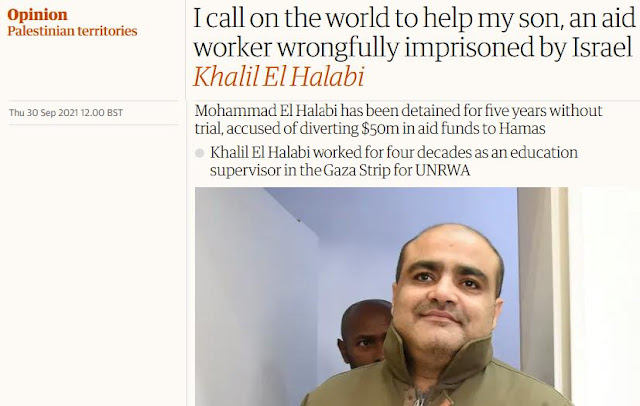

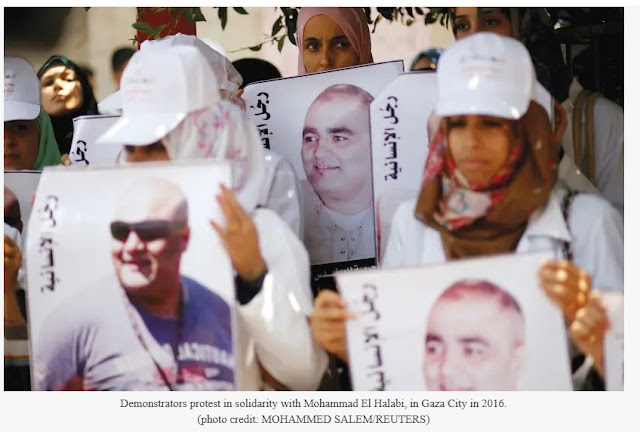
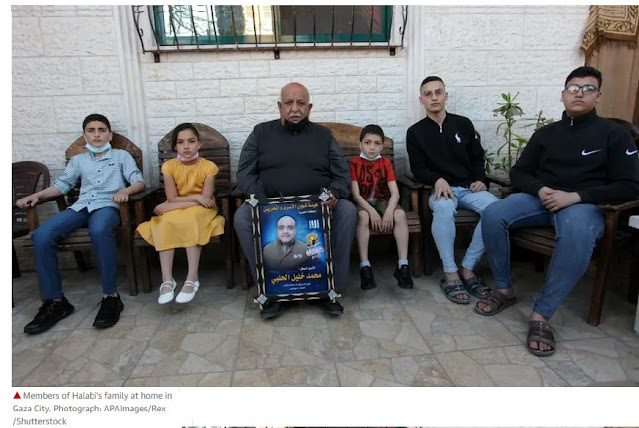
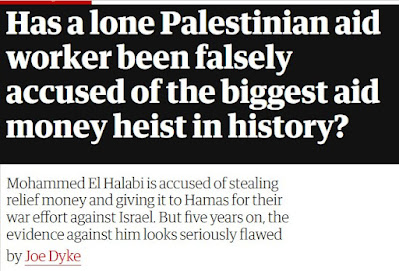
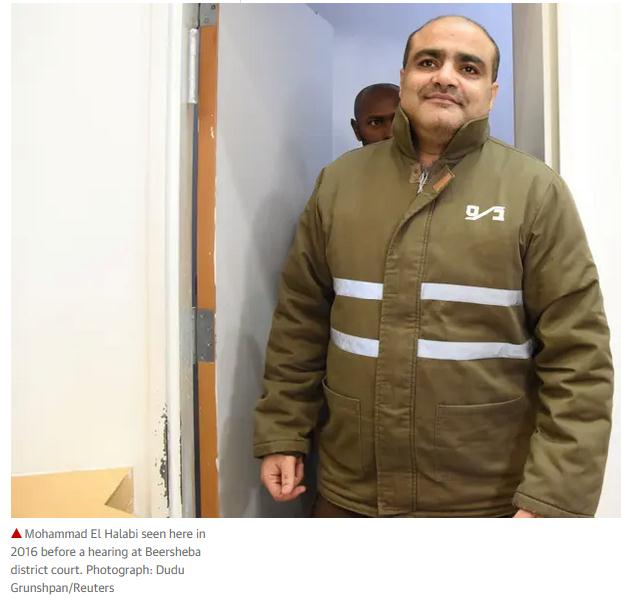
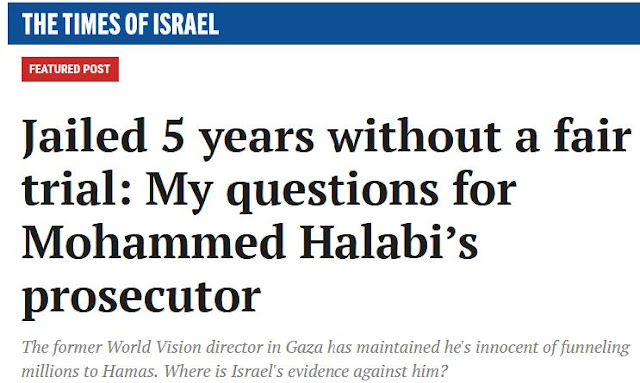
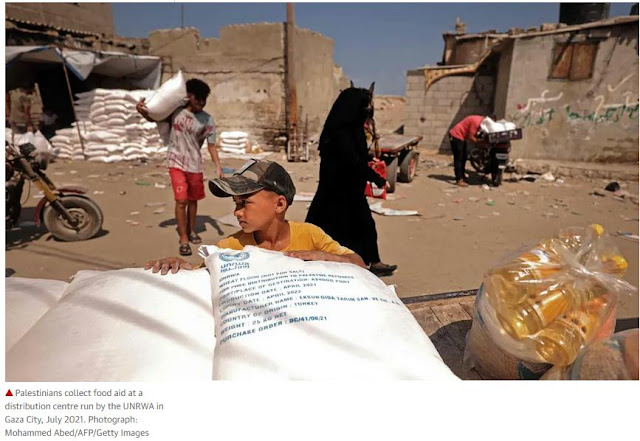
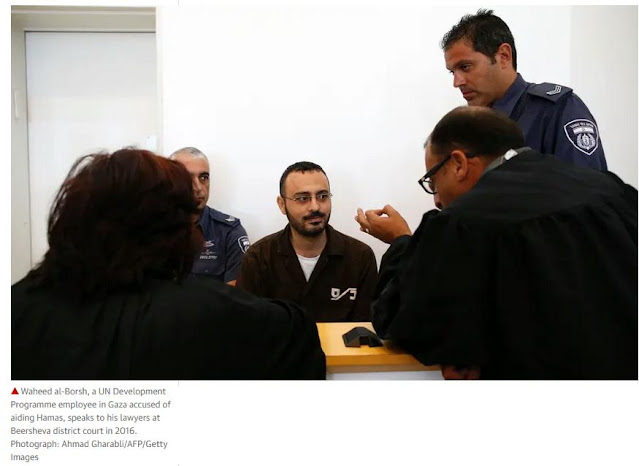
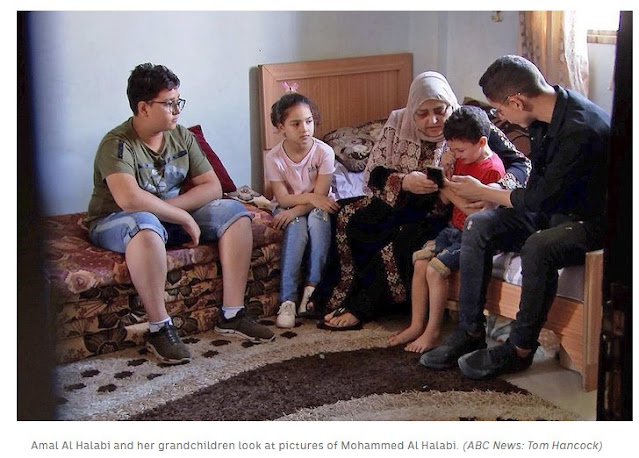
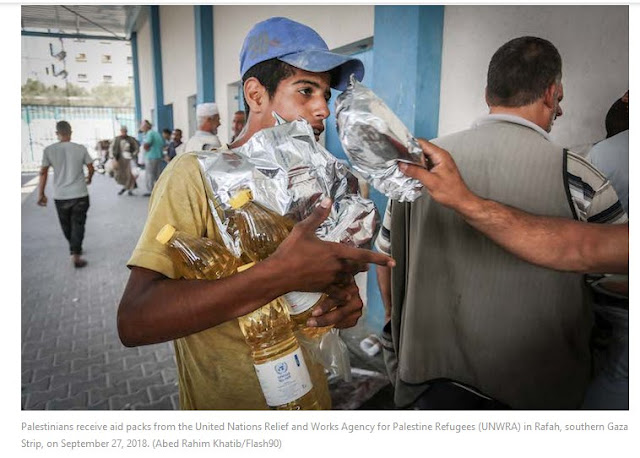
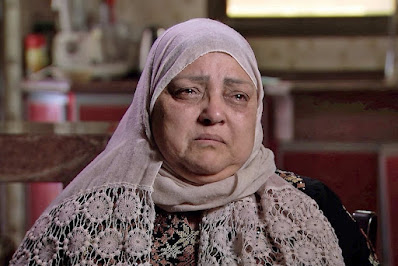

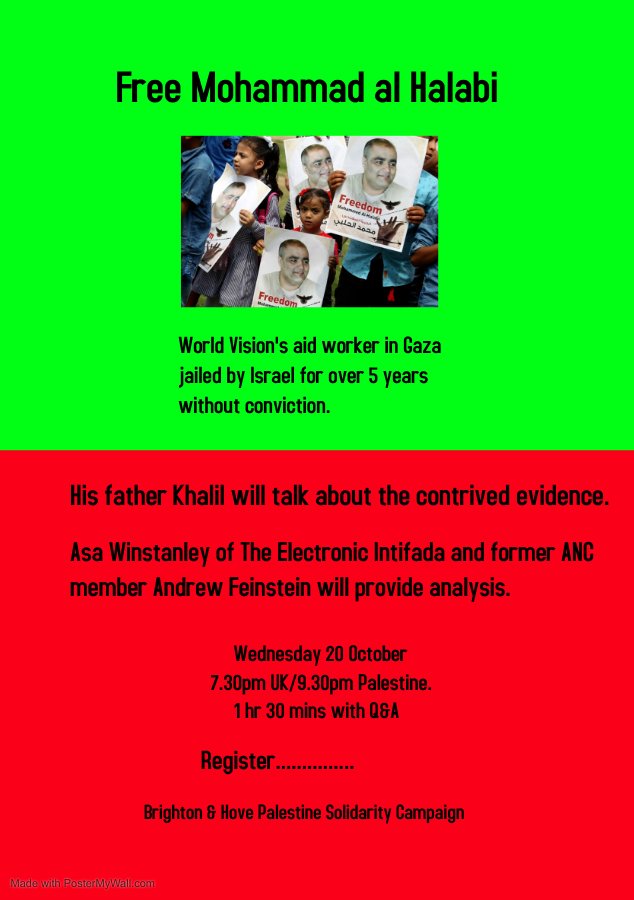
No comments:
Post a Comment
Please submit your comments below